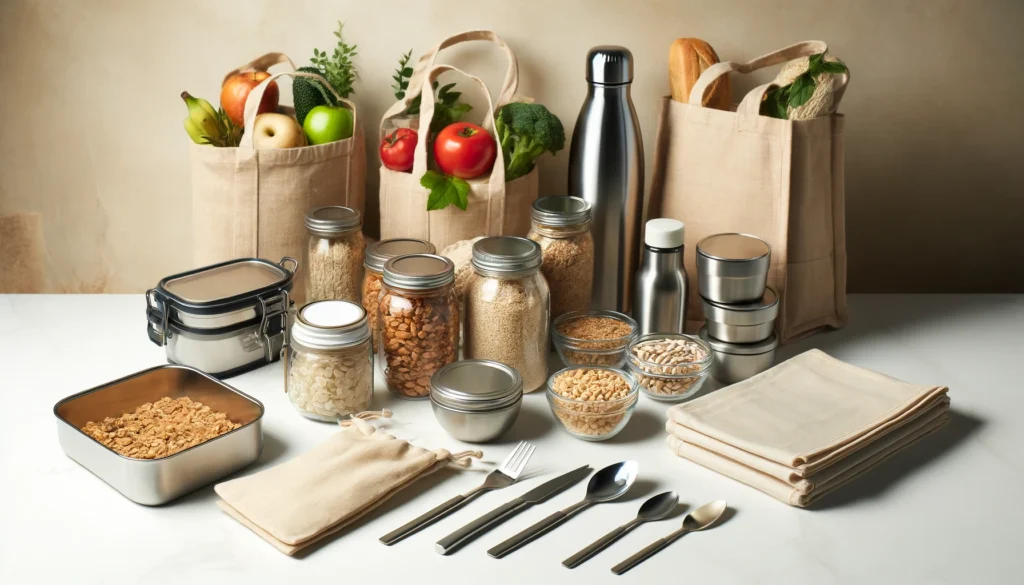Zero Waste Shopping: Why Buying in Bulk is the Green Way to Go
Are you seeking a more sustainable approach to shopping? Zero-waste shopping, a practice gaining traction as individuals heighten their awareness of their environmental impact, could be the solution. This involves planning your purchases, bringing your own reusable bags and containers, and avoiding single-use items. One eco-friendly shopping method to ponder is bulk buying. This not only curbs packaging waste but also reaps numerous rewards for the planet and your finances.

Buying in bulk means purchasing products without single-use packaging or excessive branding. Instead, you bring your own containers and fill them with the desired quantity of food staples like rice, pasta, or beans, cleaning supplies such as detergent or dish soap, or personal care items like shampoo or body wash. This eliminates the need for plastic bags, bottles, or containers that often end up in landfills or pollute our oceans.
Moreover, buying in bulk often translates to significant financial savings, as you’re procuring larger quantities at a reduced per-unit cost. This approach not only fosters mindful consumption, heightening your awareness of the products you purchase and their potential waste, but also rewards you for your sustainable choices. By opting for this eco-friendly choice, you can shrink your environmental footprint and contribute to a healthier planet for future generations, all while saving money.
Join the zero waste movement and become part of a community making a significant impact. Discover how buying in bulk can help you shop sustainably, saving both money and the environment. Your individual choices, when combined with others, can lead to a healthier planet for future generations.
What is buying in bulk?
Buying in bulk refers to purchasing products in large quantities without single-use packaging. Instead of buying items pre-packaged in individual servings or portions, you bring your containers, such as jars, cloth bags, or reusable containers, and fill them up with the desired amount of the product. This method of shopping allows you to reduce waste by eliminating the need for disposable packaging, such as plastic bags, bottles, or containers.
Bulk shopping is not limited to just food products. Many stores now offer bulk options for cleaning supplies, personal care items, and even pet food. By buying in bulk, you can choose the exact quantity you need, reducing the chances of food waste or expired products sitting unused in your pantry.
Benefits of buying in bulk for the environment
Buying in bulk offers several environmental benefits. By reducing packaging waste, you can significantly reduce your carbon footprint and contribute to a healthier planet. Here are some of the main benefits of buying in bulk for the environment:
1. Reduces plastic waste
One of the most significant environmental issues we face today is plastic pollution. Single-use plastic packaging, such as bags, bottles, and containers, often ends up in landfills, takes hundreds of years to decompose, and threatens wildlife. By buying in bulk and using your reusable containers, you can significantly reduce the amount of plastic waste generated from your shopping habits.
2. Minimizes energy and resources used in packaging production
Packaging materials require significant amounts of energy, resources, and water. Buying in bulk and reducing the demand for single-use packaging can help conserve these valuable resources. Additionally, transporting products in bulk requires less energy than individually packaged items, further reducing greenhouse gas emissions.
3. Decreases food waste
When you buy in bulk, you can purchase the exact quantity of food you need, reducing the chances of food waste. Many people throw away excess food that has gone bad or expired. Buying in bulk and being mindful of your purchases can reduce food waste and save money.
4. Supports sustainable farming practices
Many bulk stores prioritize sourcing products from local farmers and suppliers who follow sustainable farming practices. By purchasing from these stores, you indirectly support sustainable agriculture, which helps preserve biodiversity, reduces harmful pesticides and fertilizers, and promotes healthier ecosystems.
How buying in bulk reduces waste
Buying in bulk is a simple and effective way to reduce waste in your daily life. Here’s how this sustainable shopping practice helps in waste

1. Eliminates single-use packaging
One of the primary advantages of buying in bulk is avoiding single-use packaging. You can use your reusable containers instead of bringing home multiple plastic bags or containers with each purchase. This eliminates the need for packaging waste, such as plastic wrappers, bags, and disposable containers that often end up in landfills or pollute our environment.
2. Minimizes food packaging waste
Food packaging waste is a significant contributor to the overall waste generated worldwide. When you buy in bulk, you can bring your containers to fill up with the desired quantity of food. This way, you avoid purchasing products that come in excessive packaging, such as individually wrapped snacks, single-serving portions, or pre-packaged meals. By reducing food packaging waste, you can significantly reduce waste.
3. Encourages mindful consumption
Buying in bulk promotes mindful consumption by making you more aware of the products you buy and their potential waste. When you have the option to purchase larger quantities, you tend to think more about your actual needs, avoiding impulse purchases and unnecessary waste. This practice encourages you to plan your shopping trips, list essentials, and be more conscious of the products you bring into your home.
4. Reduces product waste
Buying in bulk gives you more control over the quantity of products you purchase. This helps minimize product waste, especially for perishable items like fruits, vegetables, or bakery goods. Instead of buying pre-packaged quantities that may go bad before you can consume them, you can choose the exact amount you need, reducing the chances of unused products ending up in the trash.
Zero waste shopping statistics
The zero waste movement has gained significant traction in recent years as more people become aware of the environmental impact of their consumption habits. Here are some eye-opening statistics that highlight the importance of zero-waste shopping:
According to the Environmental Protection Agency (EPA), containers and packaging account for a significant portion of municipal solid waste in the United States, about 29% of total waste generated.
The Ellen MacArthur Foundation estimates that if the current rate of plastic pollution continues, there could be more plastic than fish in the world’s oceans by 2050.
The Plastic Pollution Coalition reports that the average American throws away approximately 185 pounds of plastic annually.
A study by the University of Ghent in Belgium found that buying in bulk can reduce packaging waste by up to 96% compared to traditional grocery shopping.
These statistics highlight the urgent need to adopt more sustainable shopping practices, such as buying in bulk, to reduce waste and protect our planet.
Tips for starting your zero waste shopping journey
If you’re new to zero-waste shopping and buying in bulk, here are some practical tips to help you get started on your sustainable shopping journey

1. Assess your current shopping habits
Before you begin your zero-waste shopping journey, evaluate your current shopping habits. Identify areas where you can make changes and reduce waste, such as switching to reusable shopping bags, avoiding single-use plastic water bottles, or opting for products with minimal packaging.
2. Research bulk stores and shops near you
You can search for bulk stores or shops in your area that offer zero-waste shopping options. These stores typically have a wide range of products available in bulk, including grains, nuts, pasta, spices, oils, cleaning supplies, personal care items, and more. Could you make a list of the stores near you and their opening hours so you can plan your shopping trips accordingly?
3. Invest in reusable containers and bags
You will need reusable containers and bags to carry your purchases to participate in zero-waste shopping. Depending on the type of products you plan to buy, invest in various containers, such as glass jars, stainless steel containers, or cloth bags. Ensure that your containers are clean and dry before heading to the store.
4. Make a shopping list and plan ahead
Create a shopping list and plan ahead to make your zero-waste shopping trips more efficient. Take stock of the items you need and estimate the quantities required. This will help you avoid impulse purchases and ensure you only buy what you need, reducing the chances of waste or excess food left unused.
5. Start small and gradually transition to bulk shopping
Transitioning to zero-waste shopping and buying in bulk can be overwhelming at first. You can start by replacing one or two items on your shopping list with bulk options. As you become more comfortable with the process, you can gradually increase the number of items you purchase in bulk. Remember, every small step counts towards reducing waste and making a positive impact.
Finding bulk stores and shops near you
Depending on your location, finding bulk stores and shops that offer zero-waste shopping options can be a challenge. However, with some research and exploration, you can discover local businesses prioritizing sustainability and offering bulk shopping. Here are some ways to find bulk stores near you:
1. Online directories and websites
Online directories and websites dedicated to zero waste or sustainable living often have comprehensive lists of bulk stores and shops. These directories provide information on the location, products available, and other relevant details. Some popular online directories include Zero Waste Home, Litterless, and The Zero Waste Collective.
2. Local farmer’s markets
Farmer’s markets are excellent places to find fresh, local produce and other sustainable products. Many farmer’s markets have vendors who offer bulk options for grains, legumes, spices, and more. Stroll through your local farmer’s market and inquire about bulk shopping opportunities.
3. Co-ops and independent grocery stores
Cooperative grocery stores and independent grocers are often more inclined to offer bulk shopping options than larger chain supermarkets. These stores prioritize sustainability and often source products from local suppliers. Check out your area’s co-ops and independent grocery stores to find bulk shopping opportunities.
4. Social media and local community groups
Social media platforms like Facebook or Instagram can be valuable resources for finding bulk stores and shops near you. Look for local zero-waste or sustainable living groups where members often share recommendations and tips. Joining these communities can connect you with like-minded individuals who can provide insights into your area’s best places for zero-waste shopping.
How to prepare for bulk shopping trips
Before embarking on your bulk shopping trips, preparing and organizing yourself for a smooth experience is essential. Here are some steps to take to ensure a successful zero-waste shopping trip:
1. Clean and gather your reusable containers
Ensure your reusable containers are clean and dry before heading to the store. This will prevent cross-contamination and ensure the freshness of your purchased goods. Wash your containers thoroughly with warm, soapy water and let them air dry, or use a clean towel to dry them before filling them with your chosen products.
2. Weigh and label your containers
To avoid any confusion at the checkout counter, weigh your empty containers before heading to the store. Most bulk stores have scales available for customers to use. Once you know the weight of your containers, you can label them with the product name or the item’s PLU (Price Look-Up) code. This will make the checkout process smooth and accurate.
3. Bring your shopping list and meal plan
A shopping list and meal plan can help you stay focused and avoid unnecessary purchases. Plan your weekly meals and create a comprehensive shopping list based on your desired ingredients. This will ensure that you only buy what you need and reduce the chances of food waste.
4. Carry essential zero-waste tools
Consider carrying some essential tools with you to make your zero-waste shopping experience more convenient. These may include reusable produce bags, cloth bags for grains or bulk items, a reusable water bottle, and portable cutlery or containers for takeaway food. With these tools, you can reduce the need for single-use items and make sustainable choices wherever you go.
Zero waste shopping essentials and tools
Zero waste shopping essentials and tools
When you’re ready to embrace a zero-waste lifestyle and start buying in bulk, a few essential items and tools can make your journey easier. Here are some zero-waste shopping essentials to consider:

1. Reusable shopping bags
Invest in sturdy, reusable shopping bags that accommodate your groceries and bulk purchases. Choose bags made from natural materials like cotton or jute, as they are more durable and eco-friendly than plastic or synthetic bags.
2. Reusable produce bags
To avoid using plastic produce bags at the grocery store, opt for reusable produce bags made from lightweight, breathable materials like cotton or mesh. These bags are perfect for storing fruits, vegetables, and other loose items.
3. Glass jars and containers
Glass jars and containers are ideal for storing bulk items like grains, nuts, spices, or liquids. Look for jars with airtight lids to maintain the freshness of your purchased goods. Mason jars, for example, are versatile and come in various sizes, making them suitable for a wide range of products.
4. Stainless steel containers
Stainless steel containers are excellent for storing leftovers or for carrying takeaway food. Look for leak-proof containers with secure lids to prevent any spills or messes. Stainless steel containers are durable, lightweight, and easy to clean, making them a practical choice for zero-waste shopping.
5. Reusable water bottle
Carrying a reusable water bottle is essential for staying hydrated while on the go. Look for stainless steel or glass bottles, as they are less likely to leach harmful chemicals into your drink. Many bulk stores also provide water stations where you can refill your bottle.
6. Portable cutlery and containers
Consider carrying your portable cutlery set and small reusable containers to avoid using single-use cutlery and containers when eating out or getting takeaway food. These tools enable you to enjoy meals on the go without generating unnecessary waste.
Conclusion: Embracing a sustainable lifestyle through bulk shopping
Buying in bulk effectively reduces packaging waste, minimizes your environmental footprint, and saves money. By embracing a zero-waste lifestyle and making conscious choices while shopping, you can contribute to a healthier planet for future generations. Start small, research bulk stores near you, and invest in reusable containers and bags to begin your zero-waste shopping journey. Together, our shopping habits can significantly impact and create a more sustainable world. Join the zero waste movement and discover the benefits of buying in bulk – it’s the green way to go.
Ready to start your zero-waste journey? Visit our blog for more tips, guides, and inspiration on living sustainably.


